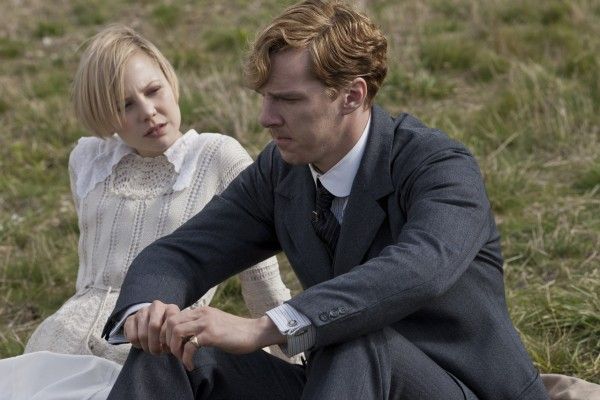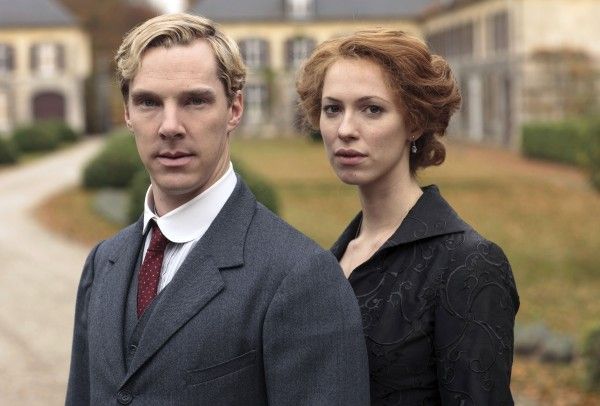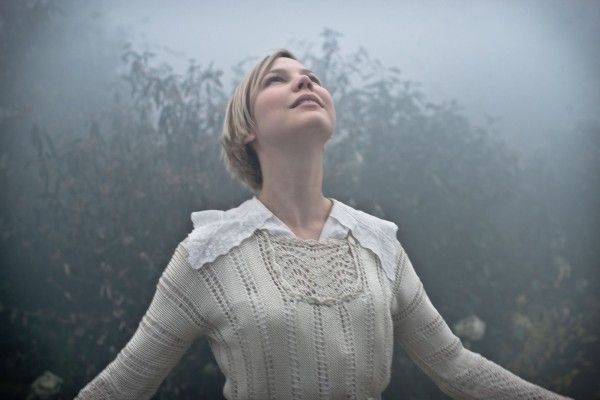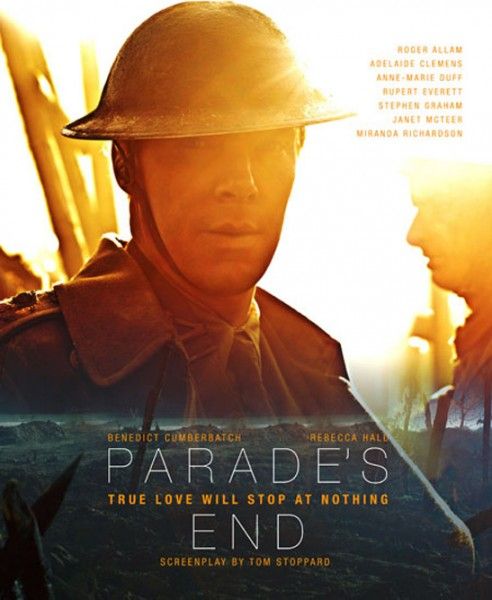Parade's End, a new five-part miniseries adaptation by Tom Stoppard (Rosencrantz and Guildenstern Are Dead) of Ford Maddox Ford's novels, is everything viewers wanted from Downton Abbey's second season, but didn't get. Whereas Downton Abbey shunted the First World War to the side (and created it as a place where one could just jaunt home every weekend or whenever one felt like it),Parade's End uses it as a centerpiece dramatically and emotionally. The Edwardian period has regained a huge amount of popularity lately, mostly thanks to Downton, but even if you're growing tired of costume dramas and staid portrayals of a bygone era of England, whose opulance is beyond anything we could imagine, don't overlook Parade's End. It will absolutely not let you down. Hit the jump for more about the adaptation, which stars Benedict Cumberbatch (Sherlock), Rebecca Hall (The Town) and Adelaide Clemens (The Great Gatsby).
On a macro level, Parade's End is about the end of Victorian and Edwardian ideals, as England is pressed into a war that would change everything. But the emotional thrust is tied up in a love triangle that is strange and complex. Christopher Tietjens (Benedict Cumberbatch) is a quietly brilliant man who is part of one of the more eccentric branches of the English aristocracy. He's not particularly handsome (although Cumberbatch still manages to be more handsome than the plump and unfortunate Tietjens of the novels), but he knows his duty to his family and his country, and has a kind and giving heart (even though he often has trouble expressing his feelings -- how very British of him).
The story begins when Tietjens marries a stunning and vivacious socialite, Sylvia (Rebecca Hall, who is luminous), who has pressed (and tricked) him into a quick union because she believes she is carrying an illegitimate child from her affair with another man. Though Sylvia does initially simply use Tietjens, and he knows it, they have an unusual relationship that is marked primarily by their inability to express any of their true feelings to each other -- a major frustration in the work -- instead falling back on silence (from Tietjens) or cutting commentary (from Sylvia, who is so easy to hate, and yet is also one of the most incredibly fascinating dramatic characters I've ever come across).
The situation is complicated further when Tietjens meets a plain but brave young suffragette, Valentine Wannope (an incredibly charming Adelaide Clemens), and the two spend most of the miniseries pining away for each other, shackled to their sense of honor. Sounds nearly insufferable, doesn't it? But Susannah White, who has directed the miniseries (and also worked on another superb but underrated HBO miniseries, Generation Kill) directs the piece in a way that makes the action (or non-action) emotional and lush. The same is true for Stoppard's adaptation of the material, which is sometimes dense and difficult (as someone commented "there is one scene that can only really be understood with a working knowledge of Latin") but also incredibly twisted and rewarding.
Parade's End is a commentary on society, on the careless viciousness of rumors and gossip, of the effects of war (Tietjens suffers from shell shock), of complicated family relations and of a period of time that was caught between traditions of an older era and an incredible moment of social upheaval. For someone like Tietjens, so insulated in his aristocratic world before the war, the change is confusing and heartbreaking to watch as he navigates his place in this new world. Sylvia and Valentine represent the old versus new, and while he has a deep and abiding love for Sylvia despite her treatment of him, he can't help but he pulled in to the enchanting real and genuine affection that Valentine offers.
The dialogue, the direction, the performances and stunning backdrops -- Downton Abbey it may at first seem, but it is not, what with that show's sunny outlooks (even through occasionally dark moments) and happy feelings. I love Downton for many reasons, but Parade's End is on another plane when it comes to storytelling -- it's is a tragic work, make no mistake, with very little redemption for its beleaguered protagonists. But when those moments come, and they (and we) are able to see a little glimmer of hope and love and happiness in a world so fraught with the darkness and chaos of war, it's incredibly rewarding for both them and us.
In the end, the miniseries is a deeply satisfying work that will engulf you in its quick run (HBO is airing it in full over three consecutive nights). It may not chase away the winter doldrums, but it will leave you wallowing in them in the most strangely pleasant way.
Parade's End begins Tuesday, February 26th on HBO, with the first of two parts starting at 9pm EST. The miniseries continues Wednesday and concludes with its final hour on Thursday.





